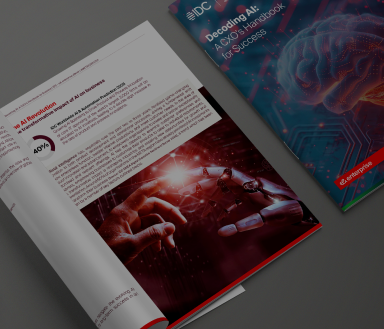Enterprise AI That Delivers: Moving Past Hype to Real Results
Despite the growing enthusiasm for AI, enterprises face significant challenges in adoption. Data complexity, unpredictable scaling costs, and security concerns hinder progress, with 64% of META organizations citing data privacy as a major issue. Infrastructure limitations and unclear business cases further slow AI deployment.
However, enterprises that align AI with business goals, invest in scalable infrastructure, and foster cultural readiness see tangible ROI. Successful AI adoption requires a strategic, integrated approach—transforming AI from an experiment into a core driver of value.
The AI Adoption Challenge: Why Many Enterprises Struggle
Despite growing enthusiasm for AI, organizations face several significant hurdles in their adoption journey. A recent survey by IDC revealed that data complexity remains a primary concern, with 45% of enterprises lacking the expertise needed for effective AI deployment. Similarly, unpredictable scaling costs pose a major challenge for many organizations. In the META region, 64% of organizations express concerns about data privacy and security, particularly when handling sensitive information.
Infrastructure limitations also present substantial barriers, with 28% of enterprises lacking the necessary computing resources—such as GPUs and high-performance servers—to scale AI workloads effectively. Additionally, 21% of organizations struggle to develop clear business cases for AI initiatives, making it difficult to secure leadership buy-in and funding. The overwhelming variety of AI solutions in the market further complicates decision-making, with 18% of organizations finding it challenging to identify the right solutions for their specific needs.
Unlocking Real AI ROI: Key Differentiators
Enterprises that successfully scale AI and achieve tangible ROI share several common traits:
Strategic AI Alignment with Business Goals: Successful AI initiatives address real business challenges, drive efficiencies, and contribute to long-term value creation. These companies view AI not as isolated experiments but as core drivers of measurable business impact.
Technology Synergy and Scalable AI Infrastructure: Technology synergy plays a crucial role, with successful organizations combining AI with complementary technologies like big data analytics, cloud computing, and automation. Investment in scalable infrastructure, including high-performance computing and enterprise-grade AI models, provides a significant competitive advantage.
Cultural AI Readiness and Change Management: Companies that foster AI literacy, provide comprehensive employee training, and cultivate a culture of innovation see higher adoption rates and more seamless integration.
Realistic Expectations and Risk Mitigation: AI isn’t a magic bullet. Enterprises that set achievable goals and refine models based on real-world feedback experience sustained success.
Building a Scalable Foundation for AI
Success in AI implementation requires an integrated approach to cloud, data, and AI strategies. Organizations must focus on:
Becoming a Data-Driven Organization: Modern data architectures, including data lakes and comprehensive governance frameworks, fuel real-time decision-making.
AI Platforms for Model Lifecycle Management: Centralized AI platforms manage data ingestion, deployment, monitoring, and compliance, ensuring consistent performance.
AI-Ready and Cloud-Native IT Infrastructure: Hybrid cloud models enable dynamic resource scaling, balancing cost-efficiency with performance.
By integrating these elements, organizations can unlock AI’s full potential, driving innovation, efficiency, and competitive advantage.
Critical Success Factors That Make-or-Break AI Implementation
The primary reason AI fails isn’t technology—it’s adoption. Key overlooked factors include:
Executive Buy-in and Strategic Alignment: AI projects require strong leadership backing to maintain momentum and ensure alignment with core business objectives.
Building High-Performing AI Teams: A skilled, interdisciplinary team combining data engineers, AI/ML experts, and business analysts is essential.
Data Governance as a Key Enabler: AI is only as good as its data. Robust data governance ensures accuracy, compliance, and trust in AI-driven decisions.
AI initiatives succeed when businesses prioritize human adoption, governance, and change management alongside technological advancements.
Advice for CEOs: The One Thing to Get Right
The impact of successful AI adoption is significant. According to IDC's Future of Work FutureScape 2024, enterprises leveraging generative AI and automation are projected to drive $1 trillion in productivity gains by 2026.
For CEOs embarking on their AI journey today, the primary focus should be on viewing AI as a business strategy rather than a technology experiment. This involves:
Start with a High-Impact Business Use Case: AI should address a real problem with measurable ROI.
Prioritize Data & Cloud Infrastructure: Scalable cloud platforms and well-structured data are essential for AI success.
Ensure AI is Explainable & Human-Friendly: Transparent AI frameworks build trust among employees and customers.
The Future of Enterprise AI: Leading the Next Wave of Digital Transformation
As AI continues to reshape industries and public services, organizations that successfully implement these strategies will be well-positioned to lead the next wave of digital transformation. The question is no longer whether AI will change the competitive landscape, but who will be at the forefront of that change.
Are you ready to lead the AI-driven transformation in your industry? To learn more about how e& enterprise Data & AI services can help accelerate your AI journey, click here.
Discover our Data and AI solutions
Dive deeper into how AI and digital transformation are shaping the future of business with these resources
Explore More About AI and Digital Transformation

e& enterprise's Role in the Middle East' Transformation

Decoding AI: A CXO's Handbook for Success

Transforming business operations with AI
Let's work together
Embrace change as our digital transformation industry experts & innovation across Cloud & Edge help you build a better tomorrow.


